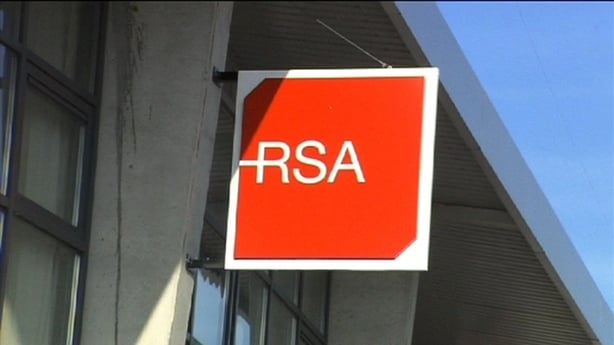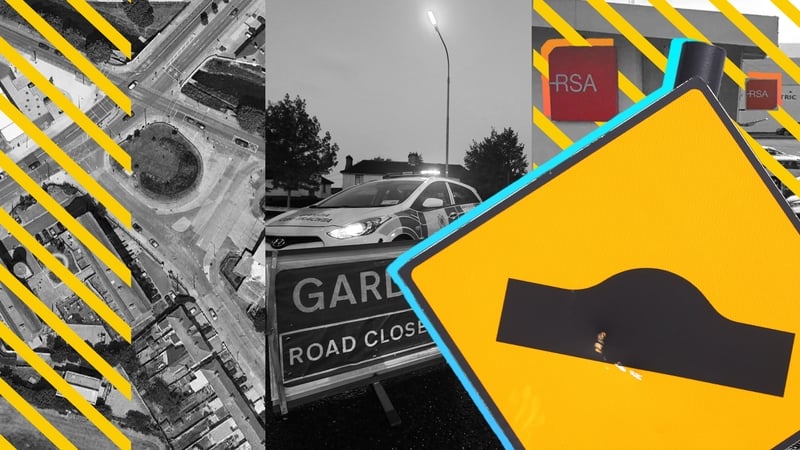Prime Time has learned that due to a GDPR issue, road engineering teams in local authorities have not been able to view data on any road collisions which have happened in Ireland over the last six years.
As a result, experts Prime Time spoke to said local authorities are 'shooting in the dark' when it comes to making key decisions about road improvements to address safety issues.
Until 2020, data provided by the Road Safety Authority, originating from the Garda PULSE system, was uploaded onto a detailed interactive map system which could be accessed by the road engineering teams in the various local authorities.
However, early that year, a legal issue arose within the RSA about whether, under GDPR legislation, it could share the data with several public bodies, including the local authorities.
As a result, the sharing of data on collisions - formally referred to as Road Traffic Collision (RTC) data - stopped.
At that time, Prime Time understands the latest data uploaded into the map system related to collisions which occurred in 2018.
Between 2022 and November 2023, the RSA says it shared ‘key variables’ on collisions with the Local Government Management Agency (LGMA), which maintained the map system for the various local authorities.
However, due to the GDPR issue, which remains unresolved, Prime Time understands that data was not uploaded to the mapping system by the LGMA.

In November 2023, the LGMA requested the RSA stop sending the data altogether, as the conclusion of legal advice received was that local authorities would need to be placed on a higher statutory footing to receive it legally under GDPR.
That month, the LGMA also removed all the old data from the mapping system.
As a result, roads engineering teams cannot even see the pre-2019 data in the mapping system - a system which is designed to be used to analyse where and when concerning collisions are arising.
The Department of Transport told Prime Time in a statement that "work is under way to establish a firm legal basis for the resumption of collision data sharing with local authorities, though safeguards on the sharing of personal information mean that this is a complex issue to resolve."
It added: "It is hoped that the sharing of collision data with local authorities will be able to resume later this year."
When asked a parliamentary question in October 2022 about the issue, the then Minister of State at the Department of Transport, Hildegarde Naughton, also said a review of RTC data sharing was on-going, and was to be concluded "over the coming months."
Read more: Rising road deaths: Why is Ireland bucking the European trend?
In recent days, the RSA told Prime Time "a formal consultation process is under way with the Data Protection Commission... to put an appropriate legislative basis in place (Ministerial Direction under Section 8 of the Road Safety Authority Act) to allow for resumption of sharing of the complete dataset."
Separately, the Data Protection Commission said in a statement "GDPR should not prevent the proportionate publication of crash location details, particularly where any personal data element is largely anonymised/limited in detail."
Local authorities ‘shooting in the dark’ on road safety
Several experts Prime Time spoke to said the provision and quality of data related to road safety in Ireland is a significant concern.
Dr Kevin Gildea, a Research Fellow at Lund University in Sweden, said Irish officials responsible for road safety interventions are "shooting in the dark," because they are unable to access the collision data.
"Just thinking very specifically about councils and their access to the data is important because if they want to improve safety on a local level they need to know where crashes are happening," he said.
"There could be dangerous intersections out there that councils don't know about because they can't get access to the data. If you can’t describe a problem, how can you solve it?" he added.
Professor Brian Caulfield of Trinity College Dublin (TCD) noted that Transport Infrastructure Ireland, the agency responsible for the 5% of the roads network not maintained by local authorities, has reliable access to RTC data.
"We know that Transport Infrastructure Ireland have the data, but they are charged with the construction and maintenance of the national roads and motorways and all of these accidents are occurring in our towns and villages and cities," he said.
Read more: The psychology of why so many young people die on our roads
Transport Infrastructure Ireland said it receives the collision data directly from An Garda Síochána under a specific legal agreement.
Prof Caulfield is TCD’s Head of Discipline in the Department of Civil, Structural and Environmental Engineering. His view is that the way in which key road safety data is managed and distributed in Ireland is "massively problematic."
He said even academic researchers funded by state bodies like the RSA find it difficult to get access to Irish collision data.
Review of data-sharing policies
In Sweden, which is considered an exemplar when it comes to road safety strategy in the EU, Road Traffic Collision (RTC) data is accessible, despite organisations there also being subject to GPDR laws.
Dr Gildea, originally from Kildare but now based in Malmö, describes RTC data as "the first key ingredient to improving road safety."
The Swedish RTC data is available for local authorities via a database called Swedish Traffic Accident Data Acquisition (STRADA). Academics and interest groups can also apply online to access sample datasets from STRADA to carry out their own research.
"Any sort of road safety project that you're working on, you need to look at the data at some point in the project. It is a really important piece of the puzzle," Dr Gildea said.
Campaign groups also frustrated

With Ireland's current trend in road fatalities the worst in Europe, some campaign groups and activists say the difficulty in accessing basic data is also a major problem for them.
Calm Crumlin Road is a community group advocating for increased road safety measures and enforcement in the Crumlin Road area of Dublin’s south city.
"The road and the general pedestrian [and] cyclist experience here is unbelievably dangerous, with incidents nearly every other day," Bonnie Dempsey, a member of the group said.
As recently as November, Josilaine Ribeiro, a carer cycling to visit a client, was killed on the Camac Bridge part of the road, when she was struck by a truck.
We need your consent to load this Datawrapper contentWe use Datawrapper to manage extra content that can set cookies on your device and collect data about your activity. Please review their details and accept them to load the content.Manage Preferences
The group says it has repeatedly requested RTC data about the road but due to the GDPR issue, it has not been released.
"We thought if the Council knew how dangerous [a road] it is then they'd do something. However, it seems, after meeting with various engineers and area managers, that they [the local authority] have absolutely no means for accessing this kind of data," Ms Dempsey said.
At a vigil to mark Ms Ribeiro's death in December, a statement was read out by Calm Crumlin Road on behalf of her family in Brazil. It called for authorities to "take actions" to keep vulnerable road users safe.
The message, signed by Ms Ribeiro's mother, sisters and partner, read "it is our deepest desire that her sacrifice helps the Dublin population to have better and safer roads."
Ms Dempsey said "ultimately, we want to see the road made safer, slower and less hostile."
In-depth coverage of road safety issues from the RTÉ Current Affairs Digital Unit and Prime Time continues across the week online and on television, with a special programme on the 11 April edition of Prime Time.

